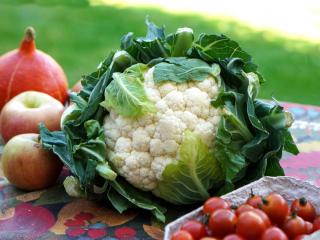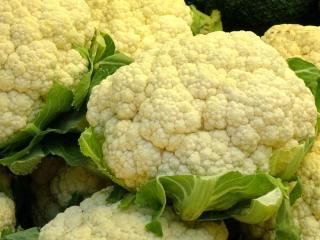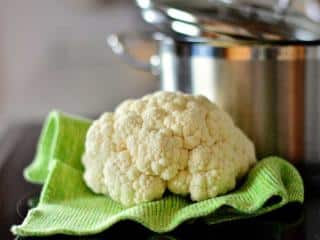

Cauliflower, with latin name Brassica botrytis, belongs to the brassica (cruciferous) family, just like broccoli and all the other cabbage varieties.
There are many varieties, some of them white, green, purple and even orange. These varieties come and go with the seasons, and cauliflower can be savored all year round.
France is one of the major cauliflower producers. Regions such as Brittany, Normandy and the North of France account for most of the cauliflower production.
 Cauliflower is native to the Middle East. It was grown by the Egyptians long before our age.
Cauliflower is native to the Middle East. It was grown by the Egyptians long before our age.
In the Ancient times, it was appreciated by the Greeks and the Romans.
Italians brought cauliflower to France in the XVIthcentury.
In the 17th century, French king Louis the XIVth asked that seeds be imported from Cyprus, which is why in France another name for it is “Chou de Chypre”, or Cyprus cabbage.
The Sun-King, as he was known, loved cauliflower. That’s why this vegetable became a staple of French food.
 Cauliflower heads are 85% water, and also provide many vitamins and minerals like calcium: 22 mg / 3.5 oz (100 g) for the bones, magnesium: 15 mg/ 3.5 oz (100 g) and potassium: 299 mg / 3.5 oz (100 g), which is very useful to regulate blood pressure. But it also contains many other nutrients that are essential for the human body, such as iron which treats anemia and finally proteins.
Cauliflower heads are 85% water, and also provide many vitamins and minerals like calcium: 22 mg / 3.5 oz (100 g) for the bones, magnesium: 15 mg/ 3.5 oz (100 g) and potassium: 299 mg / 3.5 oz (100 g), which is very useful to regulate blood pressure. But it also contains many other nutrients that are essential for the human body, such as iron which treats anemia and finally proteins.
Cauliflower has few calories. It only harbors 25 kcal / 3.5 oz (100 g). It is perfect for low-calorie diets and chasing off extra weight.This vegetable has strictly no cholesterol, which is why it is recommended for overweight persons or type 2 diabetic persons.
Cauliflower is an excellent antioxidant. It protects the heart from cardiovascular diseases. It also hinders appearance of cancers, since it protects our body cells from damage brought on by free radicals, and slows tumor growth.
Cauliflower is also a source of vitamin C (57.9 mg / 3.5 oz (100 g)), which works marvels with the body to repair and protect it. Vitamin C stimulates the immune system and joins in on defending the body.
As for the heart, cauliflower enhances arterial blood pressure.
Cauliflower also eases digestion. Fiber-rich (2,5g / 3.5 oz (100 g)) cauliflower improves intestinal transit and helps the alimentary bolus along its path. It is recommended in cases of constipation. Moreover, fibers quickly quell hunger. This helps avoid continuous snacking.
Cauliflower has excellent anti-inflammatory properties. It can reduce symptoms for arthritis and other inflammatory diseases.
Vitamin B is also present, which benefits brain functions like memory. Vitamin B9 is crucial for fetus development, it helps the baby develop its nervous system.
Thanks to its 85% water, cauliflower is also diuretic, and takes a part in detoxifying the body and eliminating accumulated toxins.
Low salt levels make cauliflower perfect for persons suffering from arterial hypertension.
Cauliflower is also recommended for pregnant women and persons who suffer from anemia. It isn’t forbidden to diabetic persons, either.
 Cauliflower has virtually no fats.
Cauliflower has virtually no fats.
How should it be eaten to best reap its many health benefits?
Cauliflower is great raw, steamed or baked. It is also delicious in soup, with cream added it is even better. And why not mash it?
However, the longer it is cooked, the lower its nutritional value.
Snack on raw cauliflower for starters. Many like it dipped in mayonnaise or cottage cheese sauce with a touch of roquefort cheese. Cauliflower is delicious when cooked together with other crunchy vegetables: carrots, cucumbers, radishes.
It can also be added to mixed salads.
Savory ideas: mixed salad with beans, tomatoes, cooked cauliflower, potatoes and shallots.
Cauliflower pairs well with meat, chicken breasts or beef bourguignon, and with certain fishes, too (cod, for instance).
When cooked, cauliflower can turn slightly bitter. Mitigate this with a little milk or a piece of bread added to the cooking water.
To avoid strong odors when cooking cauliflower, add herbs and spices to cover the smell. For example, a couple bay leaves. Another way to reduce the strong smell is to add a little bit of sugar to your cauliflower.
Cauliflower is great for your skin. Its antioxidant properties fight premature ageing of the skin and spur cell renewal.
In some cases, it is said that cauliflower can remove moles. Apply cauliflower juice on moles daily. This is natural, cheap and effective solution!
Choosing and keeping cauliflower: Go for tight heads, without blemishes. Keep it in the vegetable compartment of your fridge for up to 3 to 4 days.
0